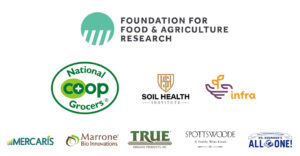OFRF co-hosts farm visit and attends Farm Bill Listening Session for Rep. Panetta, other Congressional Members.
On August 23, OFRF hosted our partners and Representative Panetta (CA-20) on a tour of Tablas Creek’s vineyard operations with Partner and General Manager Jason Hass and Jordan Lonborg, their viticulturist. After this farm tour, we all made our way to Paso Robles for a Farm Bill listening session with Representatives Carbajal, Costa, Lofgren, and Panetta with Rep. Costa chairing the meeting. This is one of many meetings like this happening across the United States, we encourage everyone to reach out to their congressional delegation to find opportunities like this and highlight the issues facing agriculture to their representatives.
Although we faced high temperatures, the tour was incredibly impressive. We all had the opportunity to learn more about the organic, regenerative practices being utilized by Tablas Creek. Like a large majority of organic producers, the vineyard prioritizes building healthy, living soils that build resilience to the increasingly hot and dry summers in the Paso Robles region. A particularly interesting piece of their operation is the use of sheep for nutrient and weed management, ultimately saving costs and frustrations in a difficult agriculture labor market. Rep. Panetta was particularly interested in their use of dry farming techniques, an incredibly important practice in such a drought impacted region of the country.
At the listening session, we joined a diverse group of stakeholders and OFRF had the opportunity to highlight the importance of the organic sector in providing both environmental and climate benefits as well as creating economic opportunity for producers, especially in CA, the leading state in organic production. We spoke about the need for Farm Bill programs to continue to invest funds in organic research, transition assistance, certification cost share, and technical assistance. Both Representatives Costa and Panetta asked follow-up questions of us on the needs of organic producers and how programs like the organic certification cost share can help create opportunities. Other stakeholders touched on diverse other issues, including the importance of USDA programs like conservation, crop insurance, as well as local issues such as the worsening drought and lengthening fire seasons and the role that the region’s cattle, vineyard, and specialty crop producers play in building resiliency to these climate-aggravated challenges.
Ultimately, it was a day full of fruitful discussions that will inform the 2023 Farm Bill process. We look forward to continuing to strengthen the connections between our representatives in the halls of the Capitol and the producers that we all depend on for safe, healthy, and tasty food and drink.



